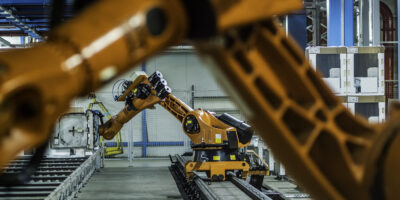
Rockwell Automation: APAC manufacturers lack skilled workforce and tech to outpace competitors.Source: Shutterstock
Rockwell Automation: APAC manufacturers lack skilled workforce and tech to outpace competitors
- A study by Rockwell Automation finds that over 45% of APAC manufacturers need more innovation, a skilled workforce, and technology to outpace competitors.
- Four out of five manufacturers still need an end-to-end supply chain planning solution.
- 44% of APAC manufacturers plan to adopt smart manufacturing within the following year.
The pandemic has put every manufacturer to the test, and a recent study by Rockwell Automation proves that leading manufacturers are still increasingly embracing smart manufacturing to outpace competitors. However, compared to 2022, there are an increasing number of manufacturers whose organizations lack the technology needed to outpace the competition in 2023.
The 8th annual State of Smart Manufacturing report by Rockwell Automation, in association with Sapio Research, surveyed the broadest audience yet. Over 1,350 manufacturers across 13 leading manufacturing countries were involved, including Australia, China, India, Japan, and the Republic of Korea.
“The top two ways respondents are addressing internal risk are to adopt new technology aimed at minimizing disruption from the workforce or supply issues (53%),” Rockwell Automation noted in its report. However, for one-third of manufacturers globally, the range of available systems and platforms leads to “technology paralysis” – an inability to decide between solutions.
When it comes to external risks like inflation, supply chain, and workforce shortages, the top-ranking mitigation tactic is also adopting new technology (44%), the study shows.
As for supply chains, Rockwell Automation finds that globally, four out of five manufacturers still lack an end-to-end supply chain planning solution. Regionally, the most significant barriers to adopting smart manufacturing for APAC manufacturers are employee resistance to technology adoption and change, lack of skill set to manage smart manufacturing implementation, and lack of clear definition of the value/ROI of smart manufacturing.
Close to half (44%) of APAC manufacturers plan to adopt smart manufacturing within the next year, Rockwell Automation noted. Out of that, China (80%), Australia (60%), and India (59%) are already using some components of smart manufacturing, the study shows. So far, quality management system (QMS) is the smart manufacturing system that APAC respondents have seen the largest ROI, followed by manufacturing execution system (MES) and enterprise resource planning (ERP).
Globally, the study reveals that the two most popular technology investments – process automation and cloud/ SaaS, adopted by 63% of participants – deliver the highest returns. Process automation has delivered the most significant ROI, then cloud/ SaaS, followed by the Industrial Internet of things (IIoT).
In terms of risk, cybersecurity rank highest as the obstacle all respondents seek to mitigate with smart manufacturing initiatives. In fact, data shows manufacturing had the highest average ransom payments in 2022 at US$2 million.
Therefore, more manufacturers (50%) surveyed are also shifting their operations to the cloud for increased cybersecurity protection and business continuity. In terms of workforce, there is a growing sense that manufacturers who can attract, retain, and upskill the right team will outperform competitors.
“88% of APAC manufacturers plan to maintain or grow employment due to technology adoption. Additionally, 39% of respondents believe they can repurpose existing workers due to their increasing use of technology,” Rockwell Automation noted.
READ MORE
- 3 Steps to Successfully Automate Copilot for Microsoft 365 Implementation
- Trustworthy AI – the Promise of Enterprise-Friendly Generative Machine Learning with Dell and NVIDIA
- Strategies for Democratizing GenAI
- The criticality of endpoint management in cybersecurity and operations
- Ethical AI: The renewed importance of safeguarding data and customer privacy in Generative AI applications


